- Back to Home »
- Hillary Clinton's big lead for 2016
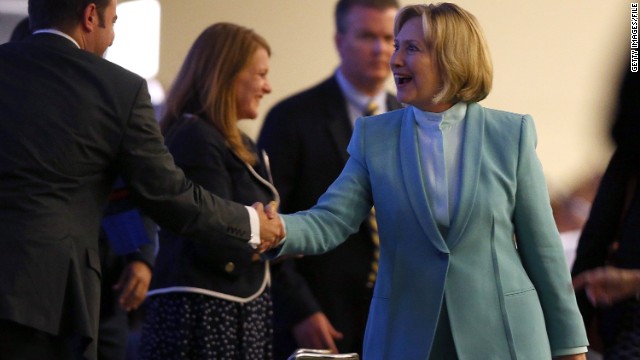
- John Avlon: A new CNN poll shows a reversal in the character of two major parties
- Avlon: Traditionally, GOP coalesce around a front-runner; Democrats root for newcomers
- Now, GOP has an eclectic pool of presidential candidates; Democrats have Hillary Clinton
- Avlon: If Clinton does not run, Democrats will have almost no strong candidate
Editor's note: John Avlon, a CNN contributor and senior columnist and executive editor of The Daily Beast, is the author of "Independent Nation" and "Wingnuts." He won the National Society of Newspaper Columnists' award for best online column in 2012.
(CNN) -- A new CNN poll confirms that we're witnessing a quiet reversal in the character of our two major parties.
Traditionally, Republicans have always coalesced around the conventional wisdom front-runner for president. Conservatives respect structure, order and party brand names. Not for nothing was the name Nixon, Bush or Dole on the GOP presidential ticket from 1952 to 2004.
In contrast, Democrats have favored the presidential candidate with the hot hand, rising from obscurity to the White House -- think Jimmy Carter, Bill Clinton and Barack Obama.

But a fresh-out-of-the-oven CNN presidential poll shows a fractured GOP field of newcomers with no clear front-runner while the Democrats have given an unprecedented lead to a brand name of their own: Hillary Clinton.
Yes, it is pathetically early to be projecting on the 2016 presidential campaign. Predictive capacity hovers somewhere near zero, and time fixated on polls would be productively used thinking about the 2014 midterms or the fights over the debt ceiling looming over our divided, dysfunctional Congress.
But as a snapshot of the underlying dynamics driving the two parties, this new poll is worth a look.
On the GOP side of the aisle, New Jersey Gov. Chris Christie narrowly leads the fractured field at 17%, one point above Rep. Paul Ryan, best known as Mitt Romney's vice presidential running mate. In the old days, the previous vice presidential nominee would be the future favorite. But that doesn't seem to be the case for Ryan, who emerged from the 2012 presidential race arguably damaged by his association with the Romney campaign.
Traditionally, the governor of blue state New Jersey wouldn't be on the GOP radar at all, but Christie -- cruising to a landslide re-election -- seems to be the exception to this and other rules.
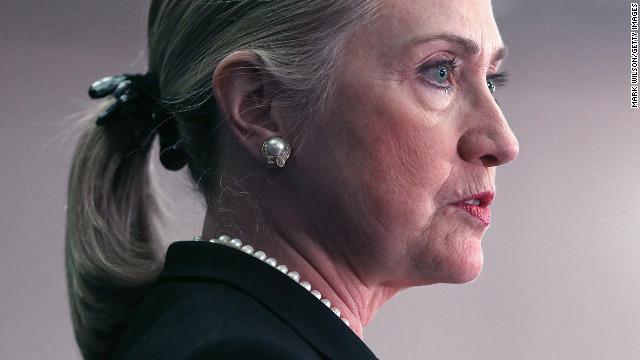 Former Secretary of State Hillary Clinton, pictured in October, has become one of the most powerful people in Washington. Here's a look at her life and career through the years:
Former Secretary of State Hillary Clinton, pictured in October, has become one of the most powerful people in Washington. Here's a look at her life and career through the years: 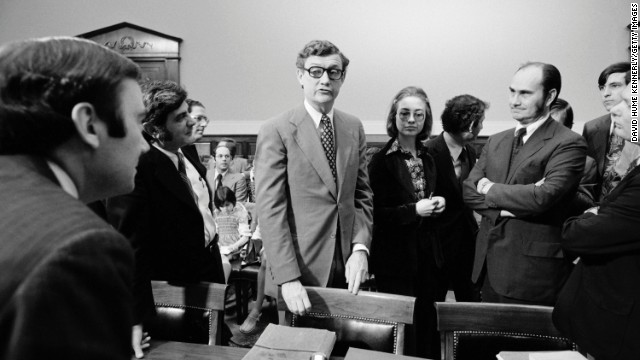 Hillary Rodham, center, a lawyer for the Rodino Committee, and John Doar, left, chief counsel for the committee, bring impeachment charges against President Richard Nixon in the Judiciary Committee hearing room at the U.S. Capitol in 1974.
Hillary Rodham, center, a lawyer for the Rodino Committee, and John Doar, left, chief counsel for the committee, bring impeachment charges against President Richard Nixon in the Judiciary Committee hearing room at the U.S. Capitol in 1974. 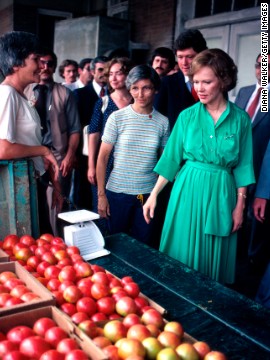
Arkansas Gov. Bill Clinton helps first lady Rosalynn Carter on a campaign swing through Arkansas in June 1979. Also seen is Hillary Clinton (center background).
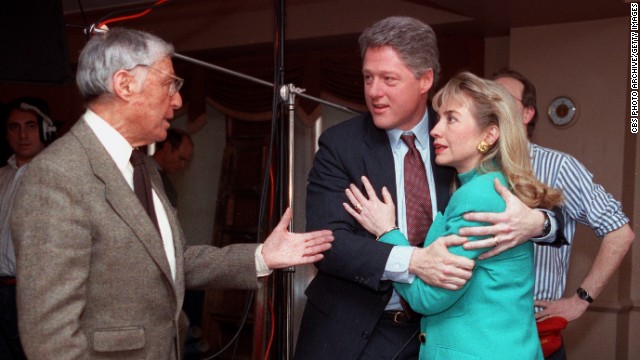 Bill Clinton embraces his wife shortly after a stage light fell near her on January 26, 1992. They talk to Don Hewitt, producer of the CBS newsmagazine "60 Minutes."
Bill Clinton embraces his wife shortly after a stage light fell near her on January 26, 1992. They talk to Don Hewitt, producer of the CBS newsmagazine "60 Minutes." 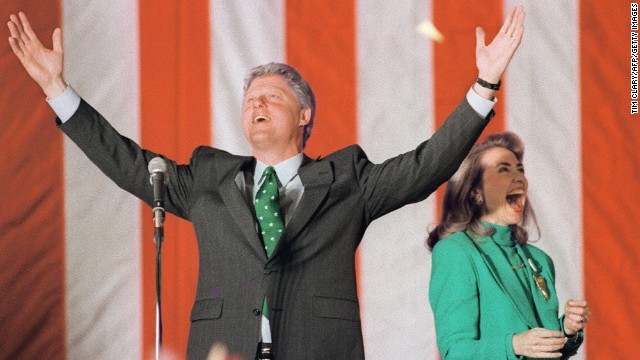 With Hillary, Democratic presidential candidate Bill Clinton waves to the crowd during his victory party after winning the Illinois primary on March 17, 1992.
With Hillary, Democratic presidential candidate Bill Clinton waves to the crowd during his victory party after winning the Illinois primary on March 17, 1992. 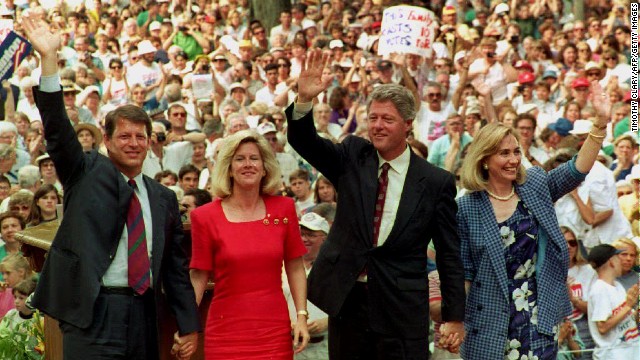 Al Gore, from left, his wife, Tipper, Bill Clinton and Hillary Clinton wave to supporters at the Chautauqua Institution in Chautauqua, New York, on August 23, 1992, after they gave speeches on family values.
Al Gore, from left, his wife, Tipper, Bill Clinton and Hillary Clinton wave to supporters at the Chautauqua Institution in Chautauqua, New York, on August 23, 1992, after they gave speeches on family values. 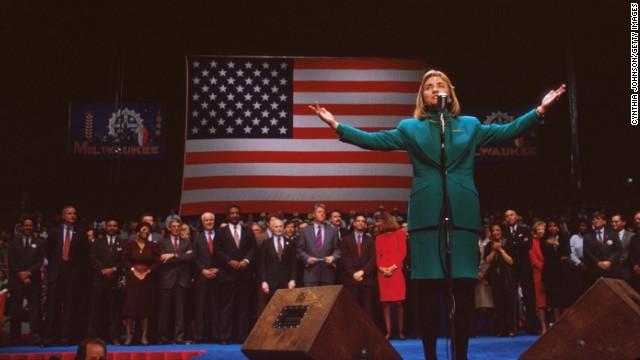 Clinton gestures at a campaign rally November 3, 1992, in Denver. After taking office, President Bill Clinton chose his wife to head a special commission on health care reform, the most significant public policy initiative of his first year in office.
Clinton gestures at a campaign rally November 3, 1992, in Denver. After taking office, President Bill Clinton chose his wife to head a special commission on health care reform, the most significant public policy initiative of his first year in office. 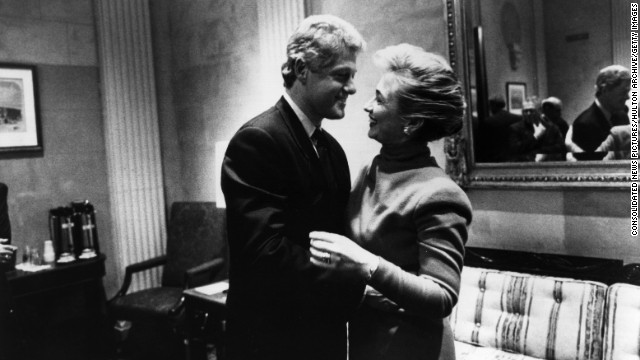 Bill and Hillary Clinton have a laugh together on Capitol Hill in 1993.
Bill and Hillary Clinton have a laugh together on Capitol Hill in 1993. 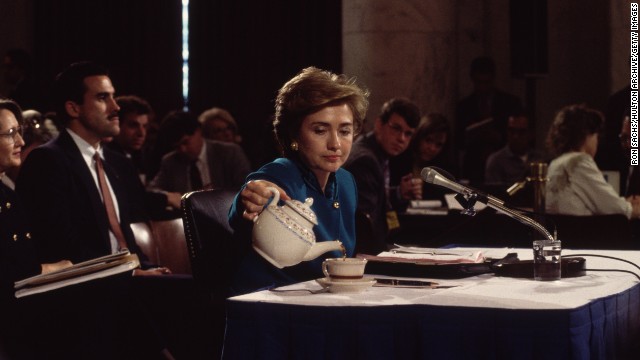 Clinton pours herself a cup of tea during her testimony to the Senate Education and Labor Committee on health care reform in 1993.
Clinton pours herself a cup of tea during her testimony to the Senate Education and Labor Committee on health care reform in 1993. 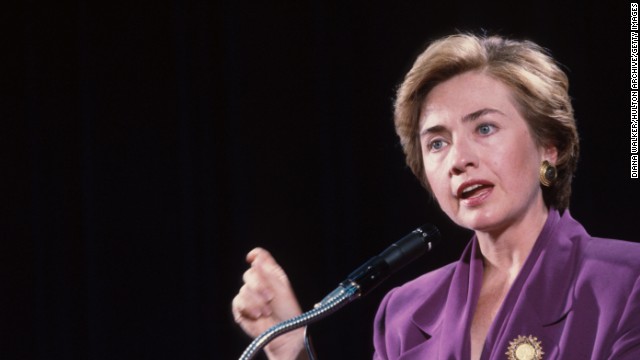 Clinton speaks at George Washington University on September 10, 1993, in Washington, during her husband's first term.
Clinton speaks at George Washington University on September 10, 1993, in Washington, during her husband's first term. 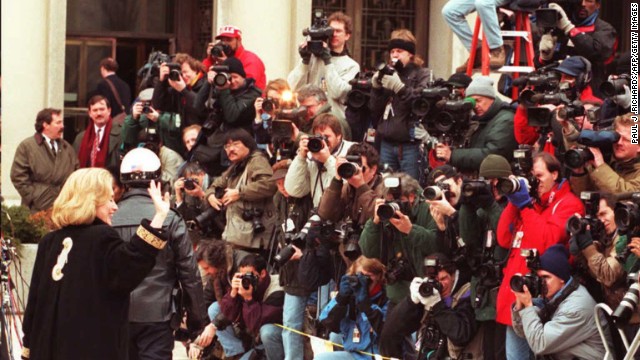 Clinton, left, waves to the media on January 26, 1996, as she arrives at federal court in Washington for an appearance before a grand jury. The first lady was subpoenaed to testify as a witness in the investigation of the Whitewater land deal in Arkansas.
Clinton, left, waves to the media on January 26, 1996, as she arrives at federal court in Washington for an appearance before a grand jury. The first lady was subpoenaed to testify as a witness in the investigation of the Whitewater land deal in Arkansas. 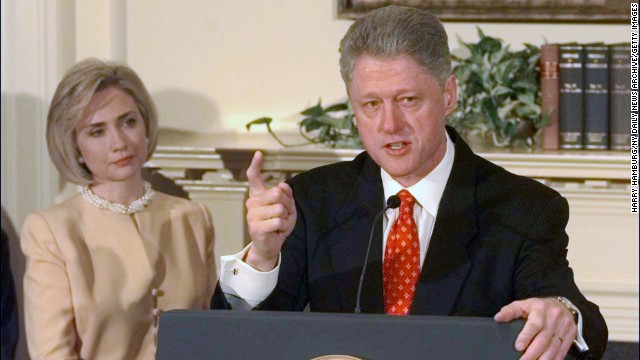 Hillary Clinton looks on as President Bill Clinton addresses the Monica Lewinsky scandal in the Roosevelt Room at the White House on January 26, 1998.
Hillary Clinton looks on as President Bill Clinton addresses the Monica Lewinsky scandal in the Roosevelt Room at the White House on January 26, 1998. 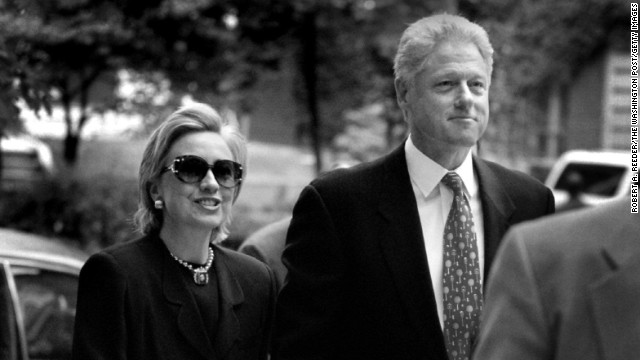 Hillary and Bill Clinton arrive at Foundry United Methodist Church on August 16, 1998, in Washington. He became the first sitting president to testify before a grand jury when he testified via satellite about the Monica Lewinsky matter.
Hillary and Bill Clinton arrive at Foundry United Methodist Church on August 16, 1998, in Washington. He became the first sitting president to testify before a grand jury when he testified via satellite about the Monica Lewinsky matter. 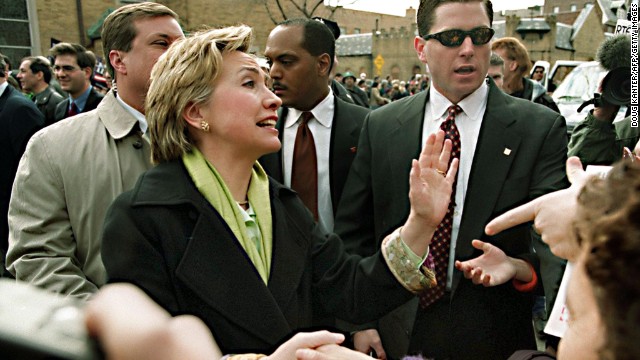 Clinton shakes hands during a St. Patrick's Day parade in the Sunnyside neighborhood of Queens, New York, on March 5, 2000.
Clinton shakes hands during a St. Patrick's Day parade in the Sunnyside neighborhood of Queens, New York, on March 5, 2000. 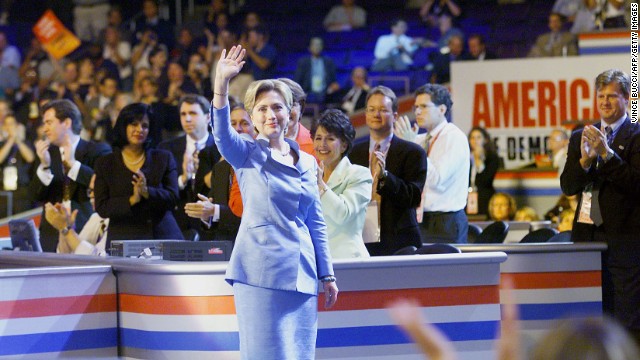 Clinton waves to the crowd as she arrives on the stage at the Democratic National Convention on August 14, 2000, at the Staples Center in Los Angeles.
Clinton waves to the crowd as she arrives on the stage at the Democratic National Convention on August 14, 2000, at the Staples Center in Los Angeles. 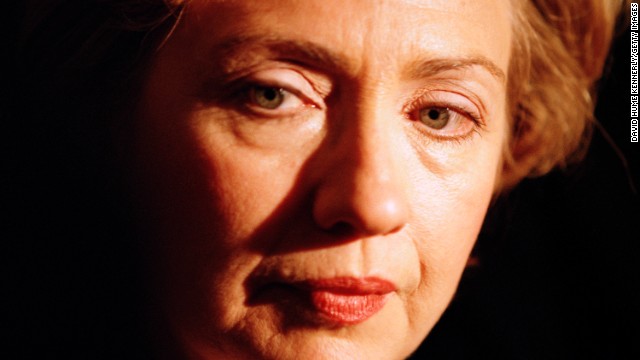 Clinton campaigns for a Senate seat at Grand Central Station on October 25, 2000, in New York.
Clinton campaigns for a Senate seat at Grand Central Station on October 25, 2000, in New York. 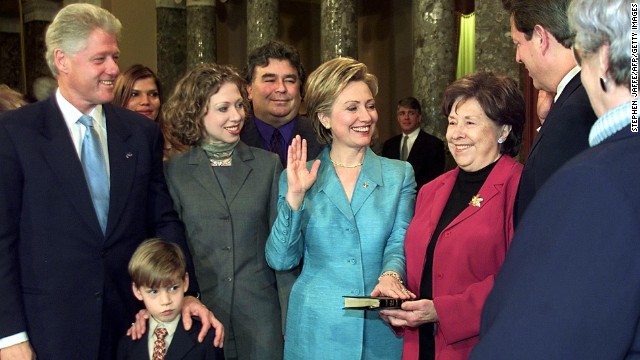 First lady Hillary Clinton is sworn in as a senator in a reenactment ceremony with President Bill Clinton, from left, nephew Tyler, daughter Chelsea, brother Hugh Rodham, mother Dorothy Rodham and Vice President Al Gore in the Old Senate Chamber on Capitol Hill on January 3, 2001, in Washington.
First lady Hillary Clinton is sworn in as a senator in a reenactment ceremony with President Bill Clinton, from left, nephew Tyler, daughter Chelsea, brother Hugh Rodham, mother Dorothy Rodham and Vice President Al Gore in the Old Senate Chamber on Capitol Hill on January 3, 2001, in Washington. 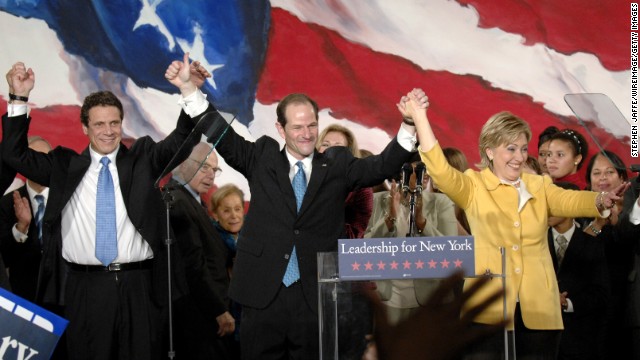 Andrew Cuomo, from left, Eliot Spitzer and Clinton celebrate with the crowd of Democratic supporters after their wins in their various races on November 7, 2006, in New York.
Andrew Cuomo, from left, Eliot Spitzer and Clinton celebrate with the crowd of Democratic supporters after their wins in their various races on November 7, 2006, in New York. 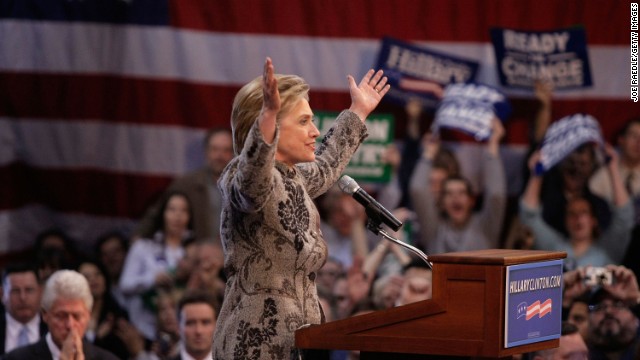 Clinton speaks during a post-primary rally on January 8, 2007, at Southern New Hampshire University in Manchester, New Hampshire.
Clinton speaks during a post-primary rally on January 8, 2007, at Southern New Hampshire University in Manchester, New Hampshire. 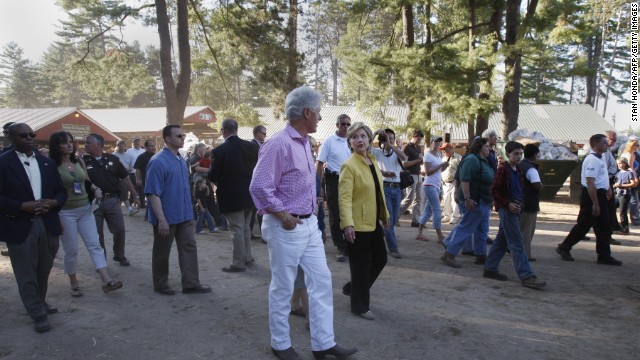 The Clintons pay a visit to the 92nd Annual Hopkinton State Fair on September 2, 2007, in Contoocook, New Hampshire.
The Clintons pay a visit to the 92nd Annual Hopkinton State Fair on September 2, 2007, in Contoocook, New Hampshire. 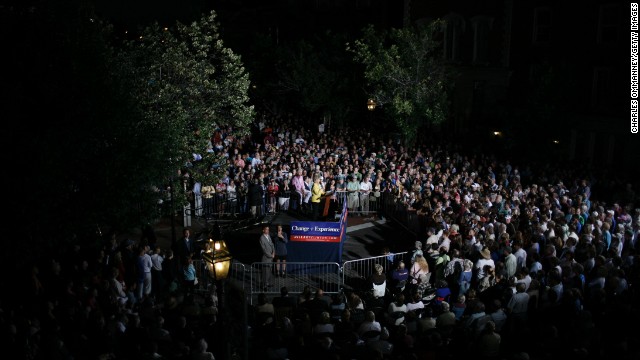 Clinton speaks at a fall kickoff campaign rally on September 2, 2007, in Portsmouth, New Hampshire.
Clinton speaks at a fall kickoff campaign rally on September 2, 2007, in Portsmouth, New Hampshire. 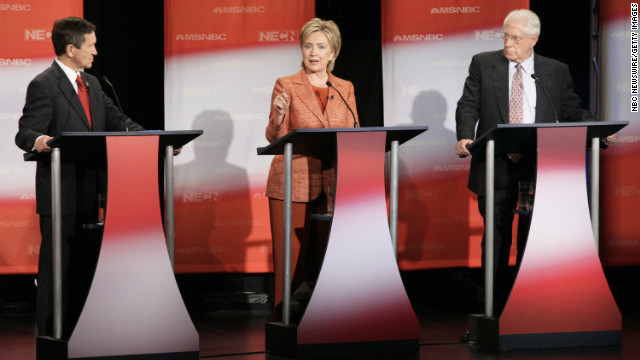 Clinton addresses a question during a Democratic presidential candidates debate at Dartmouth College in Hanover, New Hampshire, on September 26, 2007. Also pictured are U.S. Rep. Dennis Kucinich of Ohio, left, and former U.S. Sen. Mike Gravel of Alaska.
Clinton addresses a question during a Democratic presidential candidates debate at Dartmouth College in Hanover, New Hampshire, on September 26, 2007. Also pictured are U.S. Rep. Dennis Kucinich of Ohio, left, and former U.S. Sen. Mike Gravel of Alaska. 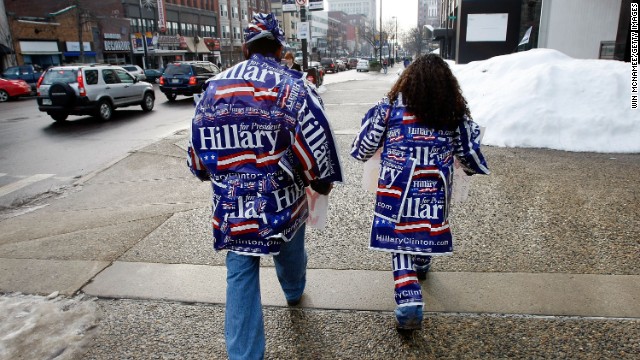 Felipe Bravo, left, and Christian Caraballo are covered with Hillary Clinton stickers in downtown Manchester, New Hampshire, on January 8, 2008.
Felipe Bravo, left, and Christian Caraballo are covered with Hillary Clinton stickers in downtown Manchester, New Hampshire, on January 8, 2008. 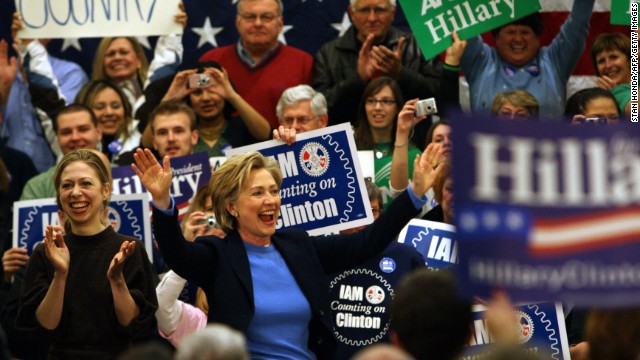 Clinton campaigns with her daughter, Chelsea, on January 1, 2008, in Council Bluffs, Iowa, two days ahead of the January 3 state caucus.
Clinton campaigns with her daughter, Chelsea, on January 1, 2008, in Council Bluffs, Iowa, two days ahead of the January 3 state caucus. 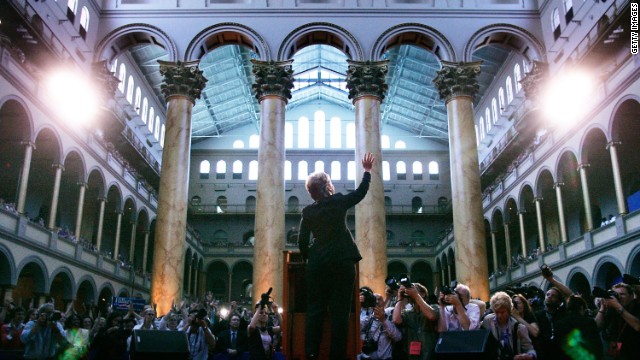 Sen. Clinton waves as she speaks to supporters at the National Building Museum on June 7, 2008, in Washington. Clinton thanked her supporters and urged them to back Sen. Barack Obama to be the next president of the United States.
Sen. Clinton waves as she speaks to supporters at the National Building Museum on June 7, 2008, in Washington. Clinton thanked her supporters and urged them to back Sen. Barack Obama to be the next president of the United States. 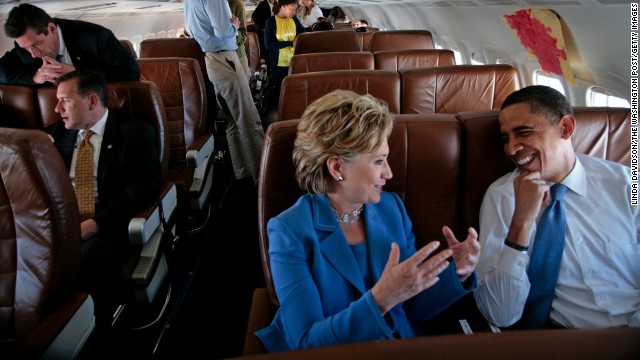 Barack Obama and Clinton talk on the plane on their way to a Unity Rally in Unity, New Hampshire, on June 27, 2008.
Barack Obama and Clinton talk on the plane on their way to a Unity Rally in Unity, New Hampshire, on June 27, 2008. 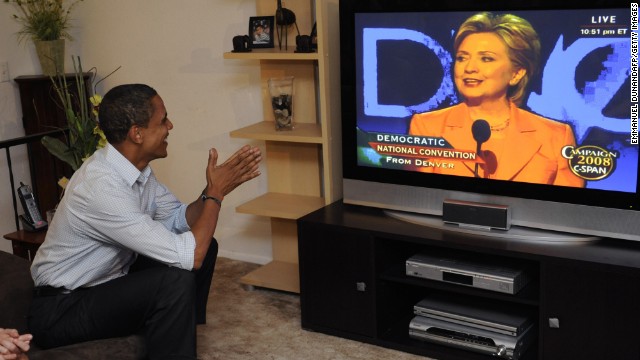 U.S. Democratic presidential candidate Barack Obama watches Sen. Hillary Clinton address the Democrate National Convention at a Democratic supporters' group in Billings, Montana, on August 26, 2008. The two endured a long, heated contest for the 2008 nomination.
U.S. Democratic presidential candidate Barack Obama watches Sen. Hillary Clinton address the Democrate National Convention at a Democratic supporters' group in Billings, Montana, on August 26, 2008. The two endured a long, heated contest for the 2008 nomination. 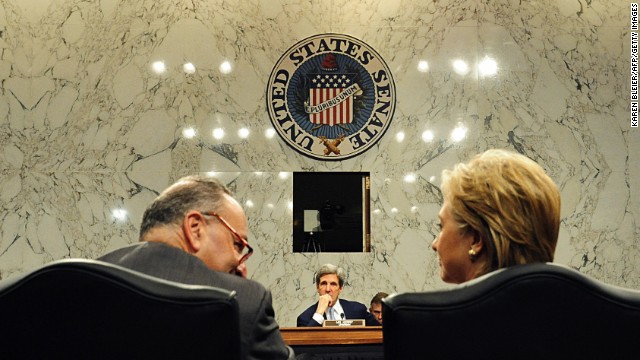 Sen. Charles Schumer, left, looks toward Secretary of State designate Clinton as committee chairman Sen. John Kerry, center, looks on during nomination hearings on January 13, 2009, on Capitol Hill.
Sen. Charles Schumer, left, looks toward Secretary of State designate Clinton as committee chairman Sen. John Kerry, center, looks on during nomination hearings on January 13, 2009, on Capitol Hill. 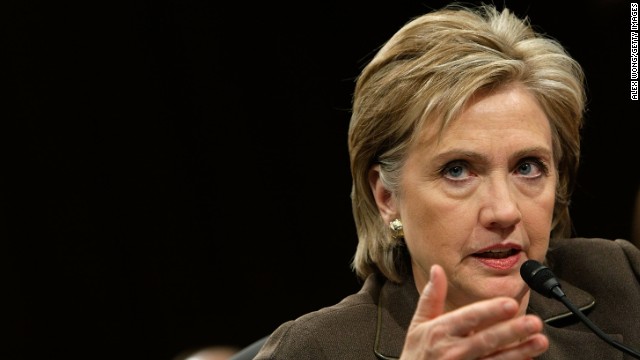 Clinton testifies during her confirmation hearing for secretary of state before the Senate Foreign Relations Committee on Capitol Hill on January 13, 2009, in Washington.
Clinton testifies during her confirmation hearing for secretary of state before the Senate Foreign Relations Committee on Capitol Hill on January 13, 2009, in Washington. 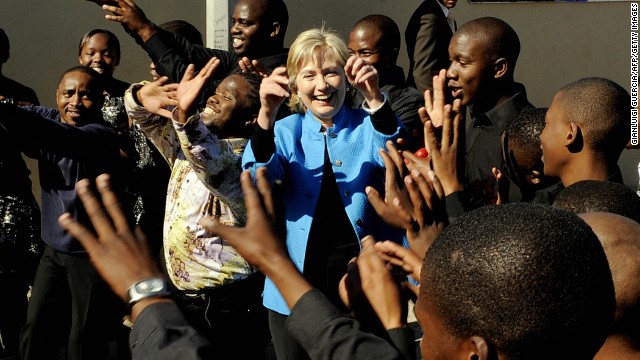 Clinton dances with a local choir as while visiting the Victoria Mxenge Housing Project in Philippi on the outskirts of Cape Town, Souith Africa, on August 8, 2009.
Clinton dances with a local choir as while visiting the Victoria Mxenge Housing Project in Philippi on the outskirts of Cape Town, Souith Africa, on August 8, 2009. 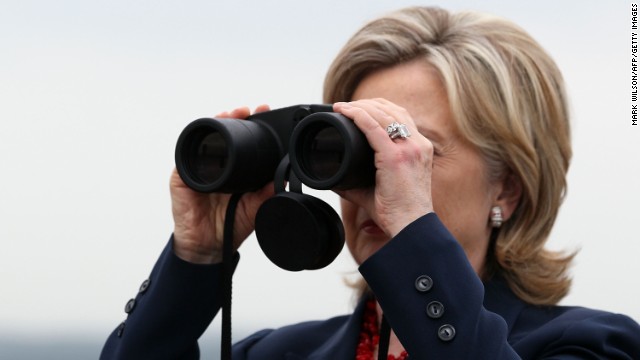 Clinton looks through binoculars toward North Korea during a visit to observation post Ouellette at the Demilitarized Zone separating the two Koreas in Panmunjom on July 21, 2010.
Clinton looks through binoculars toward North Korea during a visit to observation post Ouellette at the Demilitarized Zone separating the two Koreas in Panmunjom on July 21, 2010. 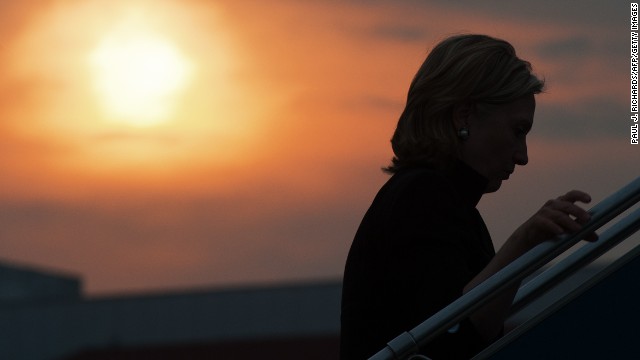 Clinton walks up the steps to her aircraft at sunset as she leaves an ASEAN meeting July 23, 2010, in Hanoi, Vietnam.
Clinton walks up the steps to her aircraft at sunset as she leaves an ASEAN meeting July 23, 2010, in Hanoi, Vietnam. 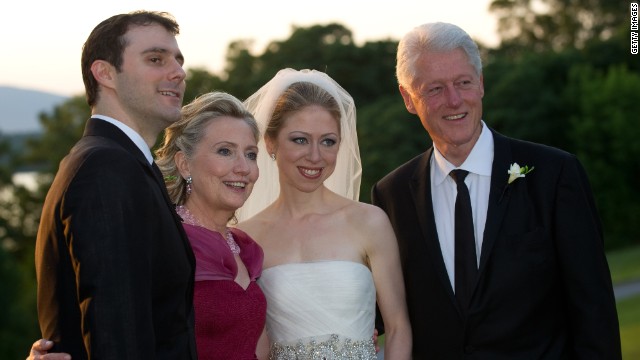 From left: Hillary and Bill Clinton pose on the day of their daughter Chelsea's wedding to Marc Mezvinsky at the Astor Courts Estate on July 31, 2010, in Rhinebeck, New York.
From left: Hillary and Bill Clinton pose on the day of their daughter Chelsea's wedding to Marc Mezvinsky at the Astor Courts Estate on July 31, 2010, in Rhinebeck, New York. 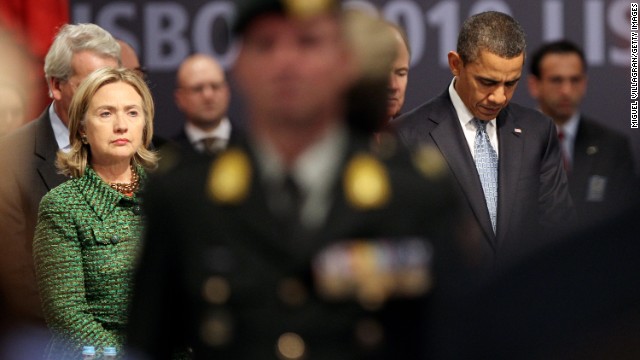 U.S. President Barack Obama and Clinton observe a moment of silence before a NATO meeting on November 19, 2010, in Lisbon, Portugal.
U.S. President Barack Obama and Clinton observe a moment of silence before a NATO meeting on November 19, 2010, in Lisbon, Portugal. 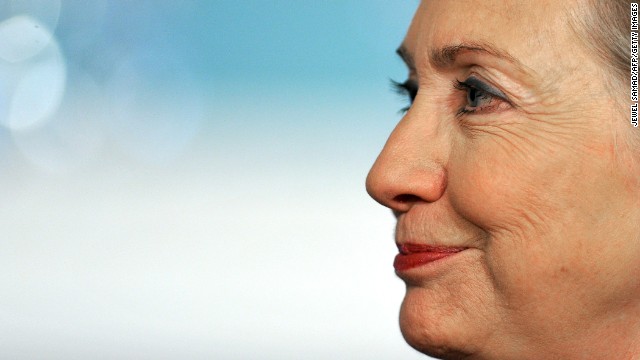 Clinton listens as Turkish Foreign Minister Ahmet Davutoglu (not in picture) makes a brief statement before a bilateral meeting at the State Department in Washington on November 29, 2010.
Clinton listens as Turkish Foreign Minister Ahmet Davutoglu (not in picture) makes a brief statement before a bilateral meeting at the State Department in Washington on November 29, 2010. 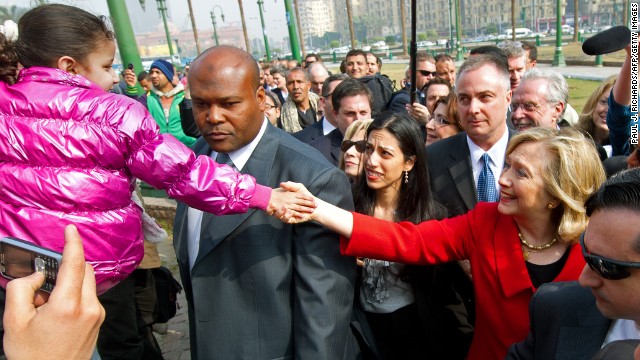 Clinton shakes hands with a child during an unannounced walk through Tahrir Square in Cairo, Egypt, on March 16, 2011.
Clinton shakes hands with a child during an unannounced walk through Tahrir Square in Cairo, Egypt, on March 16, 2011. 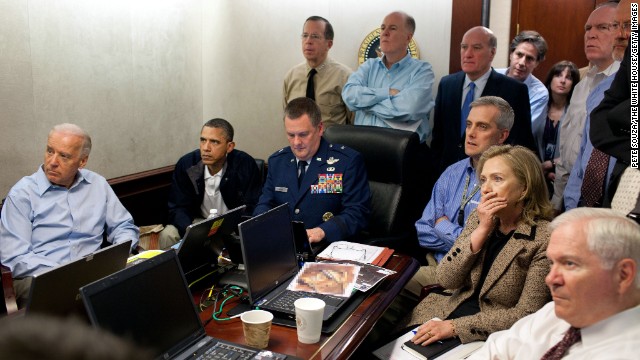 President Barack Obama, Vice President Joe Biden, Clinton and members of the national security team receive an update on the mission against Osama bin Laden in the Situation Room of the White House on May 1, 2011.
President Barack Obama, Vice President Joe Biden, Clinton and members of the national security team receive an update on the mission against Osama bin Laden in the Situation Room of the White House on May 1, 2011. 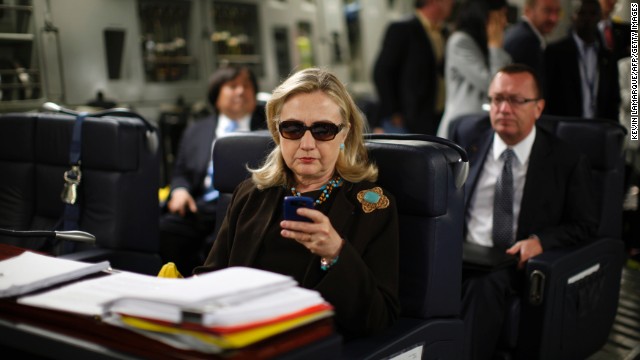 Clinton checks her PDA upon departure in a military C-17 plane from Malta bound for Tripoli, Libya, on October 18, 2011.
Clinton checks her PDA upon departure in a military C-17 plane from Malta bound for Tripoli, Libya, on October 18, 2011. 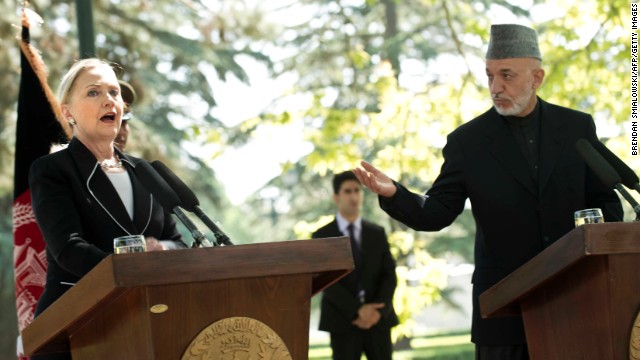 Clinton speaks as Hamid Karzai, president of Afghanistan, listens during a news conference at the presidential palace in Kabul on July 7, 2012.
Clinton speaks as Hamid Karzai, president of Afghanistan, listens during a news conference at the presidential palace in Kabul on July 7, 2012. 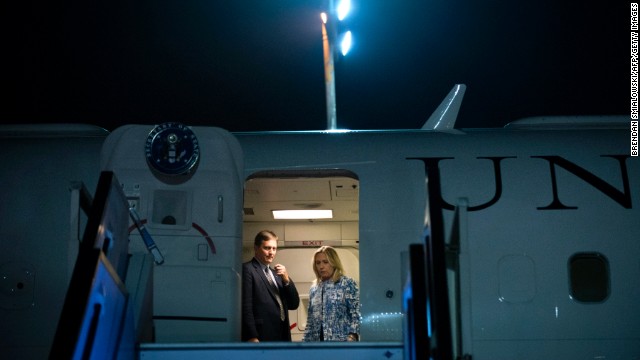 Clinton arrives at Ben Gurion International Airport in Lod, outside Tel Aviv, Israel, on July 15, 2012.
Clinton arrives at Ben Gurion International Airport in Lod, outside Tel Aviv, Israel, on July 15, 2012. 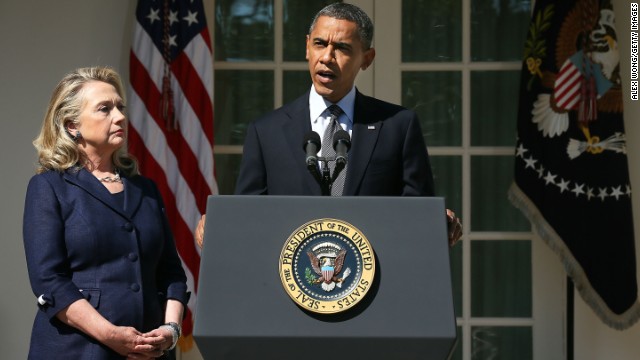 Clinton looks on as President Barack Obama makes a statement in response to the attack at the U.S. Consulate in Libya on September 12, 2012 at the Rose Garden of the White House.
Clinton looks on as President Barack Obama makes a statement in response to the attack at the U.S. Consulate in Libya on September 12, 2012 at the Rose Garden of the White House. 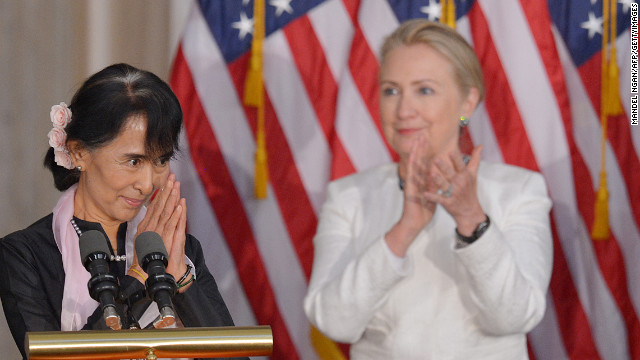 Clinton applauds Aung San Suu Kyi during a ceremony where Suu Kyi was presented with the Congressional Gold Medal on September 19, 2012 in the Rotunda of the Capitol in Washington, DC.
Clinton applauds Aung San Suu Kyi during a ceremony where Suu Kyi was presented with the Congressional Gold Medal on September 19, 2012 in the Rotunda of the Capitol in Washington, DC. 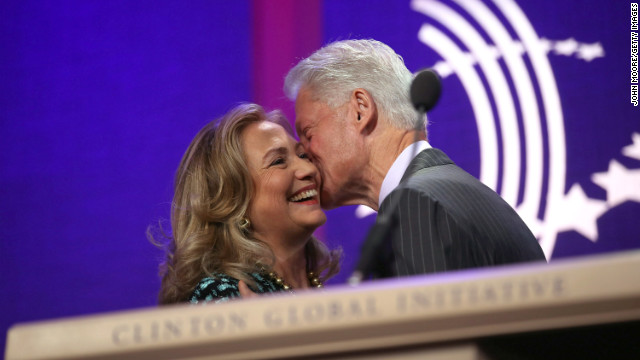 Former U.S. President Bill Clinton kisses his wife after introducing her at the Clinton Global Initiative annual meeting on September 24, 2012 in New York City.
Former U.S. President Bill Clinton kisses his wife after introducing her at the Clinton Global Initiative annual meeting on September 24, 2012 in New York City. 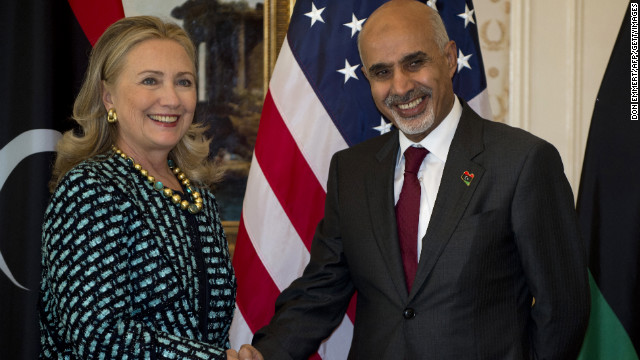 Clinton shakes hands with Libyan President Mohamed Magariaf on September 24, 2012 in New York.
Clinton shakes hands with Libyan President Mohamed Magariaf on September 24, 2012 in New York. 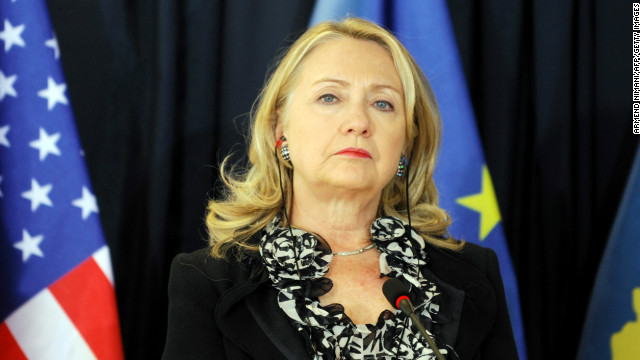 Clinton stands during a press conference following meetings at the Prime Minister's Office in Pristina, Kosovo, on October 31, 2012. Clinton said that Kosovo's unilaterally declared independence, fiercely opposed by Serbia, was 'not up for discussion'.
Clinton stands during a press conference following meetings at the Prime Minister's Office in Pristina, Kosovo, on October 31, 2012. Clinton said that Kosovo's unilaterally declared independence, fiercely opposed by Serbia, was 'not up for discussion'. 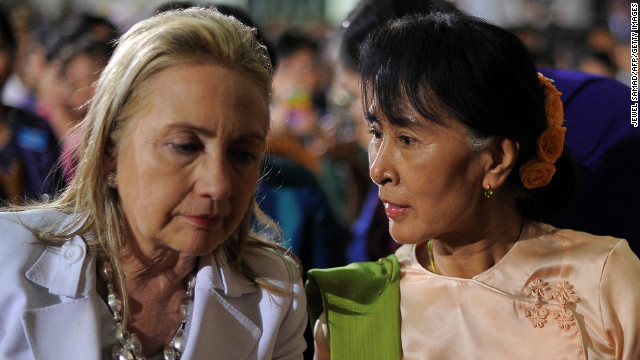 Clinton chats with Myanmar opposition leader Aung San Suu Kyi before President Barack Obama speaks at the University of Yangon in Yangon on November 19, 2012.
Clinton chats with Myanmar opposition leader Aung San Suu Kyi before President Barack Obama speaks at the University of Yangon in Yangon on November 19, 2012. 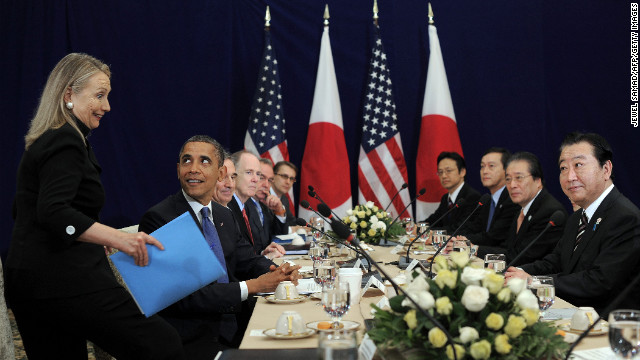 President Barack Obama looks at Clinton before the start of a bilateral meeting with Japanese Prime Minister Yoshihiko Noda, far right, during the East Asian Summit at the Peace Palace in Phnom Penh, Cambodia, on November 20, 2012.
President Barack Obama looks at Clinton before the start of a bilateral meeting with Japanese Prime Minister Yoshihiko Noda, far right, during the East Asian Summit at the Peace Palace in Phnom Penh, Cambodia, on November 20, 2012. 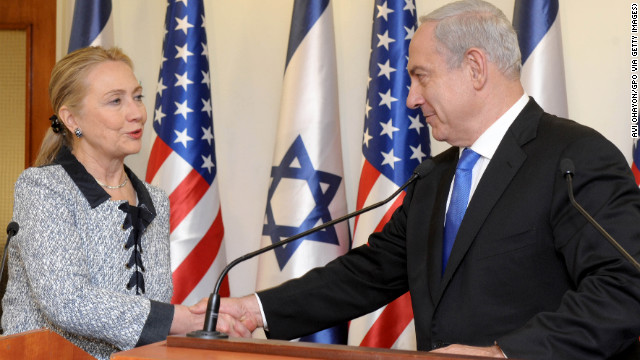 Israeli Prime Minister Benjamin Netanyahu shakes hands with Clinton at the prime minister's office November 20, 2012 in Jerusalem, Israel. Clinton arrived in Israel as efforts by Western and Arab diplomats to end the confrontation between Israel and Gaza have escalated.
Israeli Prime Minister Benjamin Netanyahu shakes hands with Clinton at the prime minister's office November 20, 2012 in Jerusalem, Israel. Clinton arrived in Israel as efforts by Western and Arab diplomats to end the confrontation between Israel and Gaza have escalated. 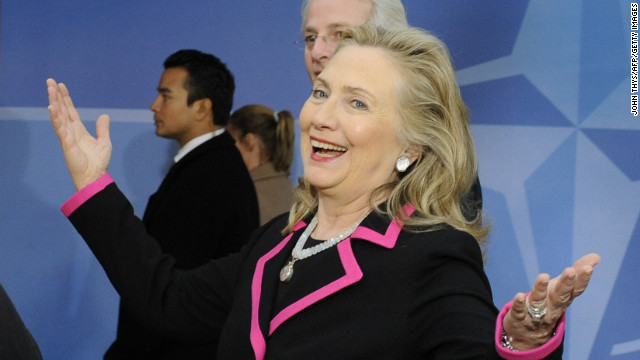 Clinton arrives on December 4, 2012 for a meeting of foreign ministers from the 28 North Atlantic Treaty Organization (NATO) member-countries in Brussels to discuss Syria and Turkey's request for Patriot missiles to be deployed protectively on the Turkish-Syrian border.
Clinton arrives on December 4, 2012 for a meeting of foreign ministers from the 28 North Atlantic Treaty Organization (NATO) member-countries in Brussels to discuss Syria and Turkey's request for Patriot missiles to be deployed protectively on the Turkish-Syrian border. 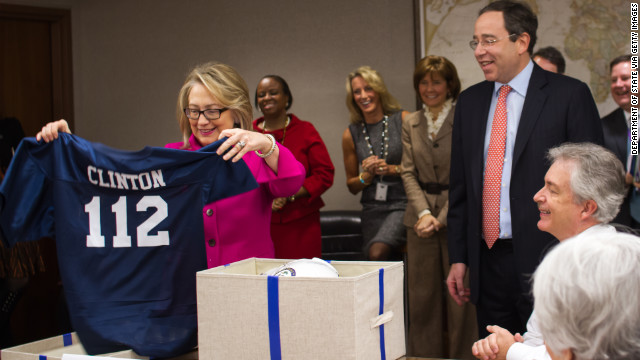 Clinton receives a sports jersey and football helmet from Deputy Secretary Tom Nides, center, after returning to work on January 7, following a fall where she hit her head and doctors later detected a blood clot. The jersey had her last name on the top and with the number 112, which represents the number of countries that she has visited as Secretary of State.
Clinton receives a sports jersey and football helmet from Deputy Secretary Tom Nides, center, after returning to work on January 7, following a fall where she hit her head and doctors later detected a blood clot. The jersey had her last name on the top and with the number 112, which represents the number of countries that she has visited as Secretary of State. 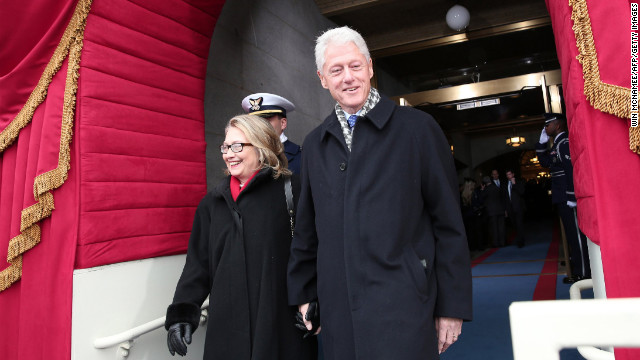 Clinton and her husband arrive for inauguration for President Barack Obama's second term at the U.S. Capitol on January 21.
Clinton and her husband arrive for inauguration for President Barack Obama's second term at the U.S. Capitol on January 21. 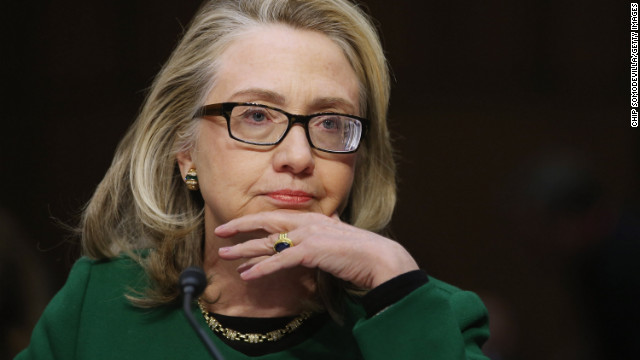 Clinton testifies before the Senate Foreign Relations Committee on Capitol Hill on January 23, in Washington, DC. Lawmakers questioned Clinton about the security failures during the September 11 attacks against the U.S. mission in Benghazi, Libya, that led to the death of four Americans, including U.S. Ambassador Christopher Stevens.
Clinton testifies before the Senate Foreign Relations Committee on Capitol Hill on January 23, in Washington, DC. Lawmakers questioned Clinton about the security failures during the September 11 attacks against the U.S. mission in Benghazi, Libya, that led to the death of four Americans, including U.S. Ambassador Christopher Stevens. 
1

2

3

4

5

6

7

8

9

10

11

12

13

14

15

16

17

18

19

20

21

22

23

24

25

26

27

28

29

30

31

32

33

34

35

36

37

38

39

40

41

42

43

44

45

46

47

48

49

50

51

52
 Photos: Clinton's political career
Photos: Clinton's political career  Christie: Boardwalk fire 'unthinkable'
Christie: Boardwalk fire 'unthinkable' 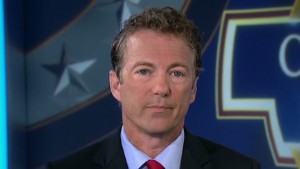 Paul: Moral message leaves Assad in place
Paul: Moral message leaves Assad in place Next on the list is Rand Paul, the scion of an outsider libertarian movement sparked by his dad's multiple runs for president. But the compelling and controversial one-time eye doctor is a first-term senator from Kentucky, far from your typical presidential timber.
Perhaps most interesting is the second tier of GOP candidates. Jeb Bush seems settled in at 10%, despite brand name and legendary brand loyalty. Two Hispanic senate Republicans, Marco Rubio and Ted Cruz, come in next at 9% and 7% respectively. And then, at the bottom of the barrel, come two 2012 aspirants: Texas Gov. Rick Perry and former Pennsylvania Sen. Rick Santorum.
Far from being strengthened by their 2012 campaigns, these two candidates seem weakened by the experience. Rick Perry's "oops" heard round the world still resonates while Santorum's strident social conservatism doesn't seem to be taken seriously by 95% of the party faithful. Strange days.
The real news is on the Democratic side. Hillary Clinton has accumulated a towering 55 percentage point lead over her next closest competitor, Vice President Joe Biden, who is at 10% and doesn't exactly lack name recognition.
Below Biden are first-term Massachusetts Sen. Elizabeth Warren at 7%, New York Gov. Andrew Cuomo at 6% and Maryland Gov. Martin O'Malley -- perhaps the most openly ambitious of the bunch -- at 2%.
Clinton's dominance illustrates an interesting dynamic. Six years ago, she was a far more polarizing figure among Democrats (and independents). Today, after her service as secretary of state, she seems more qualified and less polarizing, transcending her association with the culture of wars concurrent with Bubba's two terms in office.
Tough and experienced, Clinton is now positioned as a candidate who rivals Obama's 2007 surge. She will also be positioned as the candidate of the 51%, compelling to women of all ages and even possibly competitive among Republican women in this incarnation.
Uncle Joe Biden is well liked by the rank and file, but there doesn't seem to be much of a stampede to put him on the top of the ticket. Warren's strength comes from fascination with the new and represents the growing strength of the liberal base in the party. And while successful governors like Cuomo and O'Malley have earned the right to be taken seriously as presidential candidates, the party faithful don't seem to be much interested in buying what they are selling at the moment.
If Clinton does not run for some reason, Democrats will quickly wake up to the awkward fact that they have almost no depth of the bench after two Obama terms.
So there you have it: Democrats are behaving like Republicans, falling in line behind the big brand name dominating a race that is still three years away. And Republicans are behaving like Democrats, putting forward a fractured field with no clear front-runners but elevating a New Jersey governor, a Wisconsin congressman and a Kentucky senator to the front of the pack.
Follow us on Twitter @CNNOpinion.
Join us on Facebook/CNNOpinion.
The opinions expressed in this commentary are solely those of John Avlon.







